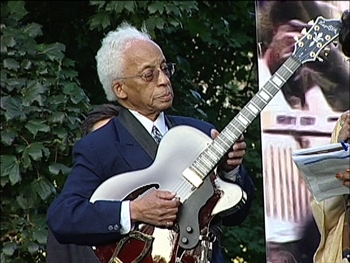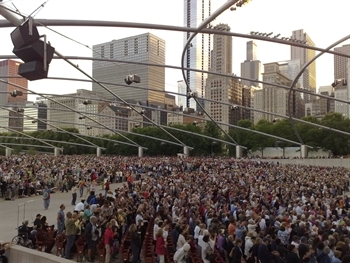
Chicago Man via Flickr
From a performance by Tony Tidwell & Favor at the 2010 Chicago Gospel Music Festival
 By Amandilo M. Cuzan
By Amandilo M. Cuzan - June 19, 2012
In 2010, the Bronzeville Alliance, a coalition of local community organizations, invited the Metropolitan Planning Council (MPC) to help staff and provide recommendations to its Bronzeville Retail Initiative to support coordinated retail planning, retention, and recruitment in this revitalizing South Side Chicago neighborhood. One of the recommendations of an MPC-organized economic development task force was to draw new people and pocketbooks to Bronzeville through the use of cultural events like music concerts, which the City is implementing this year: for the first time, Chicago's renowned Gospel Fest will move out of the Loop to run for two days in Bronzeville. Guest author Amandilo Cuzan understands the value of music as a draw, as he explains here:
As we prepare to welcome the 2012 Chicago Gospel Fest to Bronzeville, it is worth noting what the “good news” is all about. I have lived and worked in Chicago off and on all my life, mostly in Bronzeville as a videographer and cultural preservationist. Among my greatest professional accomplishments has been to carry on the legacy of that African-inspired, American-birthed art form called jazz through the production of the Jazz in the Alley® festival.
Jazz in the Alley

Guitar virtuoso George Freeman headlined the 30th Anniversary celebration of the Jazz in the Alley festival held in Bronzeville's Dunbar Park.
Amandilo Cuzan
Jazz in the Alley began in a three-car garage at 50th and Champlain in the 1950s under the guidance of jazz lover and retired auto mechanic Arthur “Pops” Simpson. What started as a simple DJ set grew into a weekly jam session that attracted thousands. Jazz greats such as Count Basie and Dizzy Gillespie were known to drop by after playing gigs in the area. Pops’ set lasted for over 20 years. In 1979, my organization, OM Productions International, took up the banner after then-Mayor Jane Byrne shut down the original alley. Today we continue the Jazz in the Alley legacy with grassroots cultural events that celebrate and preserve the rich heritage that is Jazz. It’s all about the music. Music is often called the universal language. But music is also the language of a people—a form of expression that reflects a unique struggle and culture.
Bronzeville’s musical history
Bronzeville, located roughly between 18th Street and 67th Street on the north and south, and between the Lakefront and the Dan Ryan Expressway on the east and west, is much more than a physical space. It is the soul of the city. A dynamic human adventure. A story of many stories. Most historians start this engaging tale of Bronzeville with the first Great Migration between 1900 and 1930 when hundreds-of-thousands of black people travelled north for a better life. Some go back further to the shores of Africa where the first slave ships sailed west across the Atlantic in the infamous trade that made trillions of dollars while claiming millions of lives. Others go back further still, to the sophisticated cities and budding empires of Africa that amazed and at times terrified European explorers who were seeking advantage, adventure, fame and fortune as they waged age-old family feuds that left more than a few bloody battlefields back home.
I, for one, like to go back to the real beginning. To that time before time when the motive force that I call God created that first soul music in our hearts. Music that speaks from the heart, to the heart, of the heart. Music that inspires and uplifts but also teaches, chastises and demands. Demands that we make time to put aside the cares and woes of this 21st Century existence and take time to recognize the source of it all.
Bronzeville’s gospel roots
Gospel music in its present form was birthed largely in Bronzeville by a man named Thomas A. Dorsey who, beginning in 1932, served as the music director at Pilgrim Baptist Church at 33rd and Indiana for more than 40 years. His composition Precious Lord is known the world over as the signature song of Mahalia Jackson, and was also a favorite hymn of Dr. Martin Luther King, Jr.
Next week we celebrate this great musical force called gospel and pay tribute not only to the place where it was

Crowds the size of this one in Millennium Park would be a first for Bronzeville.
Marit & Toomas Hinnosaar via Flickr
birthed, but also to the people of Bronzeville whose sacrifice, struggle and indomitable spirit continues to inspire people around the world. Come on out to Ellis Park (37th and Cottage Grove) on June 23 and 24, where music will run on a Day Stage from noon to 5 p.m. and Main Stage from 5 to 8 p.m. each day.
Gospel music. One voice of a musical language both universal and unique. Another Chicago treasure that has matured into a worldwide phenomenon. Enjoy.
Amandilo M. Cuzan is president of OM Productions International, producers of the Jazz in the Alley® festival. He also currently serves as chairman of the Bronzeville Alliance Education Taskforce. www.jazzinthealley.org